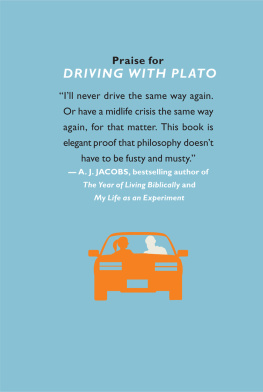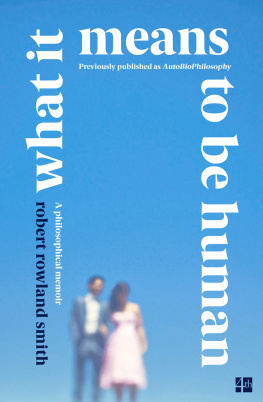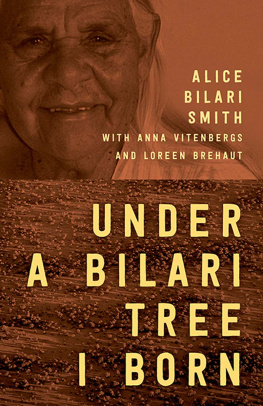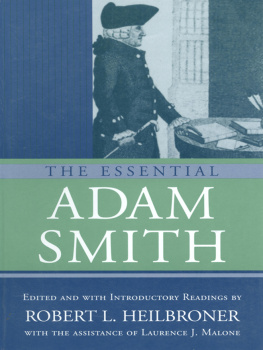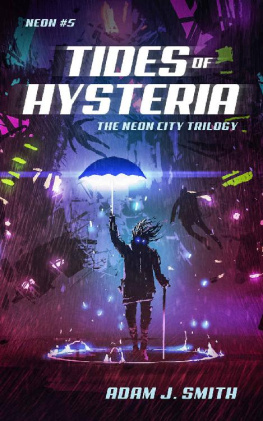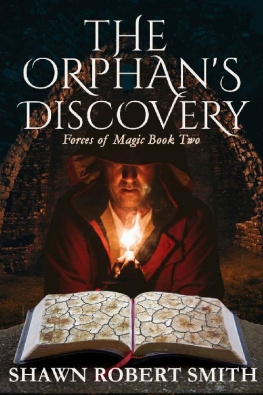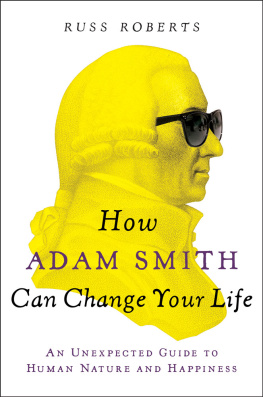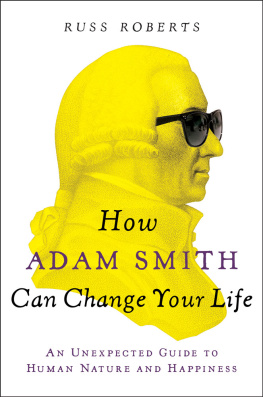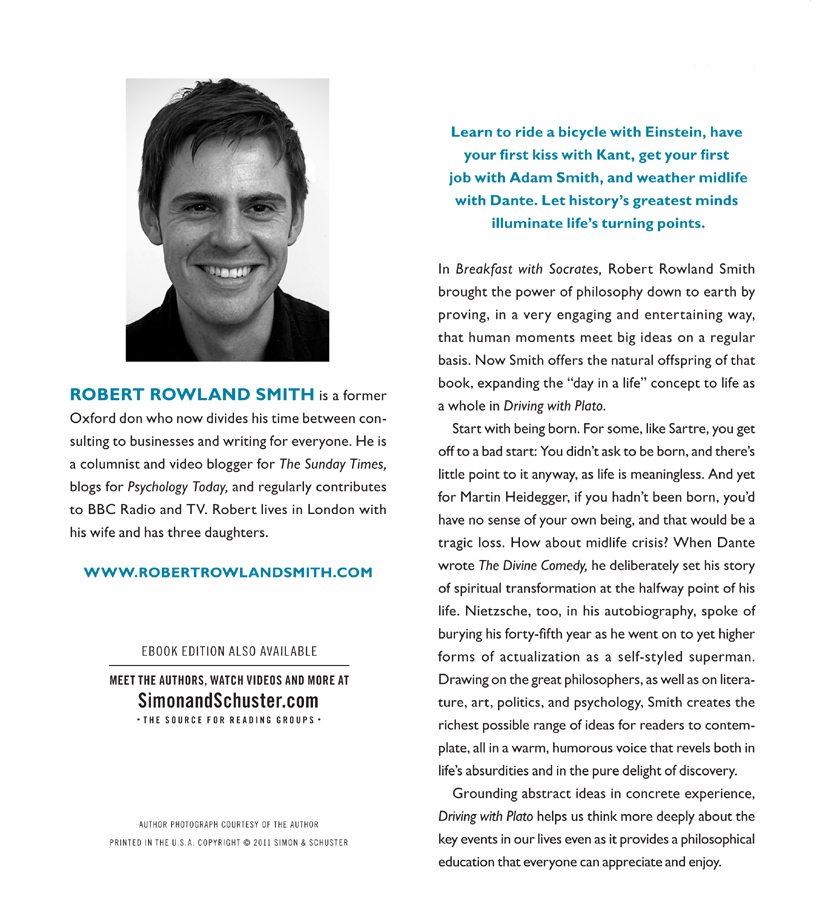

Also by Robert Rowland Smith
Breakfast with Socrates:
An Extraordinary (Philosophical) Journey
Through Your Ordinary Day


FREE PRESS
A Division of Simon & Schuster, Inc.
1230 Avenue of the Americas
New York, NY 10020
www.SimonandSchuster.com
Copyright 2011 by Robert Rowland Smith Ltd.
Originally published in Great Britain in 2011 by Profile Books Ltd.
Published by arrangement with Profile Books Ltd.
All rights reserved, including the right to reproduce this book or portions thereof in any form whatsoever. For information address Free Press Subsidiary Rights Department, 1230 Avenue of the Americas, New York, NY 10020.
First Free Press hardcover edition May 2011
FREE PRESS and colophon are trademarks of Simon & Schuster, Inc.
The Simon & Schuster Speakers Bureau can bring authors to your live event.
For more information or to book an event, contact the Simon & Schuster Speakers Bureau at 1-866-248-3049 or visit our website at www.simonspeakers.com .
DESIGNED BY ERICH HOBBING
Library of Congress Cataloging-in-Publication Data
Smith, Robert Rowland.
Driving with Plato : the meaning of lifes milestones / Robert Rowland
Smith.1st Free Press hardcover ed.
p. cm.
1. Life. 2. Life change events. 3. Meaning (Philosophy) I. Title.
BD431.S59 2011
128dc22
2010037548
ISBN 978-1-4391-8687-9
ISBN 978-1-4391-8689-3 (ebook)
To Zo, Esther, and Eden, as time goes by.
CONTENTS
All the worlds a stage,
And all the men and women merely players;
They have their exits and their entrances,
And one man in his time plays many parts,
His acts being seven ages. At first, the infant,
Mewling and puking in the nurses arms.
Then the whining schoolboy, with his satchel
And shining morning face, creeping like snail
Unwillingly to school. And then the lover,
Sighing like furnace, with a woeful ballad
Made to his mistress eyebrow. Then a soldier,
Full of strange oaths and bearded like the pard,
Jealous in honour, sudden and quick in quarrel,
Seeking the bubble reputation
Even in the cannons mouth. And then the justice,
In fair round belly with good capon lined,
With eyes severe and beard of formal cut,
Full of wise saws and modern instances;
And so he plays his part. The sixth age shifts
Into the lean and slippered pantaloon
With spectacles on nose and pouch on side;
His youthful hose, well saved, a world too wide
For his shrunk shank, and his big manly voice,
Turning again toward childish treble, pipes
And whistles in his sound. Last scene of all,
That ends this strange eventful history,
Is second childishness and mere oblivion,
Sans teeth, sans eyes, sans taste, sans everything.
William Shakespeare,
As You Like It, Act II,
scene vii, lines 13966
ACKNOWLEDGMENTS
Because Driving with Plato is the companion book to my Breakfast with Socrates , it benefits from the support of all those involved in that first publication. I thank them again. Id also like to single out both my agent, Stephanie Ebdon at the Marsh Agency, and my editor, Daniel Crewe at Profile Books, along with their colleagues; I also thank Hilary Redmon at Free Press in New York. An author couldnt ask for better.
INTRODUCTION
Imagine getting into your car and finding that as soon as you switch on the engine, it turns into a time machine. But instead of pitching you backward and forward through the history of the planet, as did the famous contraption imagined by H. G. Wells, it zooms right in on your own life. It takes you back to bawling as a baby, noses through the gates of the school where you are taking a math lesson, and pulls over by a bus stop to study you as a teenager having your first kiss. It then accelerates toward your later years, to watch you floundering in a midlife crisis, say, or having a drink at your retirement party. And when death looms into view, the car doesnt just screech to a halt: it inches forward to have a look at what might lie beyond. That is the both ordinary and extraordinary journey taken by this book.
And you have company. You look to the passenger seat and notice none other than Plato, beard blowing in the wind. Hes not just along for the ride, hes there to help you make sense of things. He observes you falling in love, for example, and explains how this very human experience connects you with the divine. Look behind into the backseat and, crammed in against the windows, you behold a whole team of writers, thinkers, painters, and other gurus, all eager to comment on what they see and offer insights about your life. Louis Althusser, the French Marxist, explains how those school gates might as well be the entrance to a prison. Leonardo da Vinci peeps at you losing your virginity and ponders how youd measure up against the ideal of purity he painted in The Virgin of the Rocks. John Milton looks on as you go through an ugly divorce and consoles you that theres nothing to feel bad aboutparadise can still be regained. You hear from Hegel on the matter of having children, Locke on the question of how those children learn to talk, and Tolstoy on how to control them so they dont talk too much. They are there, these luminaries from the history of ideas, like a raucous team of All Stars, to cajole, inform, caution, and entertain you as you pass each one of your milestones.
Many of these milestones are of course natural: being born, learning to walk, growing old, and dying. But just as many will be cultural, even if theyve gained acceptance as near-inevitable rites of passage. These include starting school, passing your driving test, moving house, and getting married. Unlike the simplest animals, we dont merely eke out a biological fate, even if, like them, were subject to laws of growth, hunger, decay, and reproduction. We create structures around us, be they material, like houses, or institutional, like schools and governments, which take on an endurance and an independence that belie their origins in the biological human that creates them. Were both natural and cultural creatures, and this book looks at both these interrelated aspects of our lives.
Decades of individualism have told us were all unique, but we enjoy a largely common trajectory through the world. True, some people will become rich, many will live in penury, and plenty will strive throughout life merely to improve on the situation they were dealt at birth, but these differences in fortune rarely alter the basic path of life as it is lived. Were all born, we all connect with others, and we all die. Not all the milestones I discuss will be passed by everyone, and they may occur in a different order, but they should all be highly familiar if only from observing friends. The strange thing is that the familiarity isnt guaranteed to make them more intelligible: no matter how many weddings you attend, say, you might not have stepped back to think about their meaning, and even if you have, you might still find the ritual bizarre. One could even say that there can be something obscure about whats most common; the fact that weve all been to job interviews makes it likely that we take them for granted and dont ever get at the essence of what is going on. And so, in the company of various thinkers, this book examines what often remains unexamined in such events and phases. It helps you think a little deeper about the key moments and transitions in your life.
Next page
